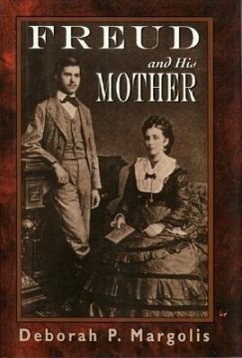Deborah Margolis is not on a Freud-bashing expedition, nor is she engaged in political idealization. Rather, she takes us on a journey guided by Freud's idea that our psychological complexes are sources of our weaknesses and our strengths. Although Freud actively sought to lead his biographers astray, Margolis's detailed knowledge of the terrain and her psychoanalytically trained perspective directs us to a fascinating exploration of 'Freud's preoedipal complexes which have so richly endowed our civilization. Margolis introduces us to mother Amalia as well as to her family of origin. We find ourselves in the home of Amalia and Jacob Freud, observing the family interactions. We become acquainted with Freud's wife, Martha - her background, their courtship and marriage, and her place in Freud's life. Margolis also explores the ofttimes passionate ebb and flow of Freud's relationships with significant persons. We are privy to an account of Breuer and his personal and professional relationship with Freud. Fliess also emerges as a primary player in Freud's development. Others, such as Jones, Schur, Zweig, and Freud's children, appear more as reporters than influencers. The significance of Margolis's work derives from her overall scholarship, especially the selection and use of primary sources: Freud's published works, personal correspondence, and firsthand accounts of persons close to Freud. She uses secondary sources only as a comparison or contrast to her own conclusions. Her modus operandi is to raise a question, provide relevant information in the form of quotes carefully culled from primary sources, and subtly invite the reader to draw inferences. Then she presents her conclusions. Whoshould read Freud and His Mother? Without question, all Freud scholars will scrutinize and evaluate the work for years to come. All psychoanalytic psychohistorians will be intrigued by Margolis's selection and presentation of data and her conclusions. Clinicians will value the work because Freud and his theories will become more understandable and humanized. Educated laypersons will be attracted to the book because of the lucid, literate style, absence of jargon, and intelligent sleuthing. Margolis's book stands alongside works by Peter Gay, Ernest Jones, and others who have discovered meaningful and constructive psychoanalytic dimensions in the founder of psychoanalysis.
Bitte wählen Sie Ihr Anliegen aus.
Rechnungen
Retourenschein anfordern
Bestellstatus
Storno





![Memoirs of Extraordinary Popular Delusions and the Madness of Crowds. 2 Vols. [In 1] Memoirs of Extraordinary Popular Delusions and the Madness of Crowds. 2 Vols. [In 1]](https://bilder.buecher.de/produkte/66/66733/66733015m.jpg)


